KU PharmChem Newsletter 2019/2020
Notes from the Chair
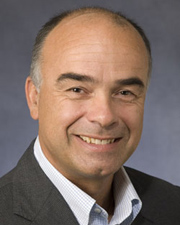 Dear Alumni and Friends,
Dear Alumni and Friends,
It is time for our annual newsletter to update you with news from the Department of Pharmaceutical Chemistry and KU. We hope that everyone is doing well, and that we have the opportunity to meet as many of you as possible at various conferences and events in 2020.
There are important news items to share. Last year, David Volkin and his team launched a new Cen-ter at KU, the Vaccine Analytics & Formulation Center (VAFC) (see: KU researchers launch center focused on advancing vaccines for the developing world). We also completed the construction of an 11,000 sqft addition to Simons Research Laboratories, which included a complete renovation of Simons Research Laboratories. Everyone coming to the area should plan on stopping by to see our new and renewed facilities. Ann Heptig has retired at the end of September 2019 after a long career at The University of Kansas.
In 2019, the Department of Pharmaceutical Chemistry graduated the second Distance Ph.D. student, Yi Yang (Genentech), with honors. The Distance Ph.D. Program has started well, and several of our current Distance Masters Students have expressed interest in continuing as Distance Ph.D. Students.
The 13th Biennial Meeting of the Globalization of Pharmaceutics Education Network (GPEN) will be organized by the University of Minnesota, October 7-10, 2020. For further information, please see: GPEN Conference
We will hold our Annual Fall Retreat at The University of Kansas on Tuesday, October 13, 2020. This Retreat will consist of lectures of four invited speakers and current students and postdocs, and a large poster session. For our graduate students, this is an opportunity to discuss their research progress with all of the faculty and other students.
The Department continues to benefit from generous financial support for predoctoral fellowships and awards donated by many individuals and several pharmaceutical companies. In addition, our faculty continue to be well funded through private and federal agencies, and have received a series of awards, which will be detailed below in the individual faculty sections.
In the following, you will find updates on the individual faculty and their laboratories. We hope that you will enjoy this newsletter, and hope to see you at one of the upcoming meetings.
Christian Schöneich
Professor and Chair
Graduate Program
Several students have completed their degrees in 2019:
- Brian Kopec (Verge Genomics)
- Melissa (Pressnall) Mihalcin
- Ryan Moulder (Amgen)
- Huan Kang (Alexion)
- Matthew Christopher
- Sanjeev Agarwal (Amgen)
- Yi Yang
- Laura (Drbohlav) Doyel
- Derek White (AbbVie)
- Yue (Martin) Hu (Bristol-Myers Squibb)
Five graduate students were recruited for Fall 2019 (picture below). One started in Spring 2020:
- Waleed Eblalla
- Olivia Henderson
- Srija Ramisetty
- Yaqi Wu
- Yilue Zhang
- Xi Luan (Spring 2020)
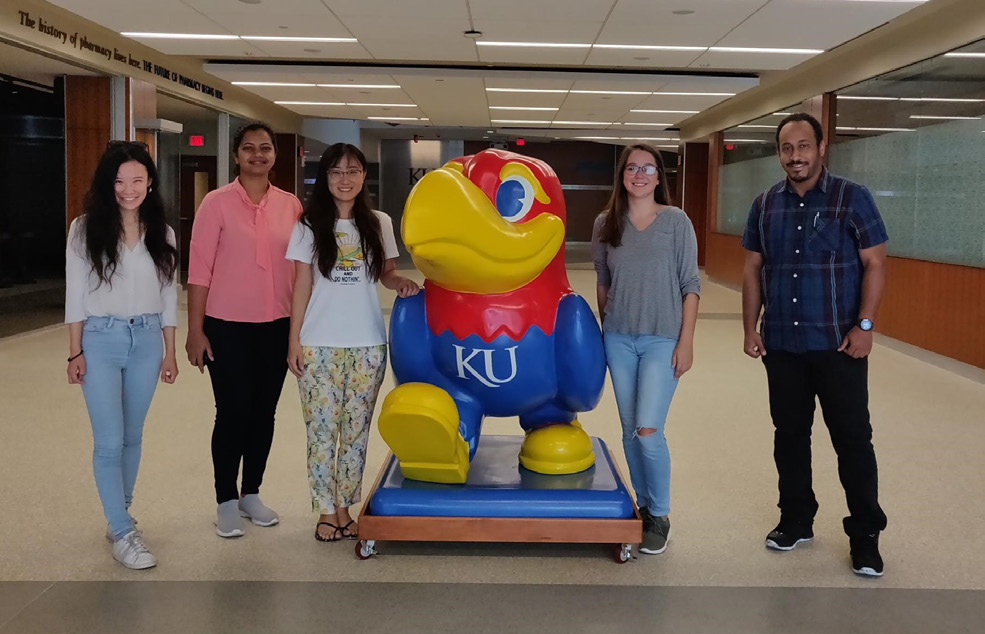
Students who have completed their degrees in the Distance Masters Program in 2019:
- Ian Hartzel (Pfizer)
- Alex Langford (Pfizer)
- Hao Lou (Amgen)
- Kristen (Millard) Forseth (Gilead)
Students currently in the Distance Masters Program are:
- Edmond Baily (Catalent)
- Yutian Gan (Genentech)
- Yuzhe Hu (Genentech)
- Casey Hurley (Gilead)
- Alexander Kozinstev (Genentech)
- Jonathan Kretz (Amgen)
- Karina Padilla (Genentech)
- Anthony Tomlinson (Genentech)
- Lun Xin (Catalent)
Students who have completed their degree in the Distance Ph.D. Program in 2019:
- Yi Yang (Genentech)
Students currently in the Distance Ph.D. program are:
- Stephanie (Vargas) Kishbaugh (BioMartin Pharm)
- Yue (Katherine) Wang (Genentech)
AAPS 2019 - San Antonio, TX
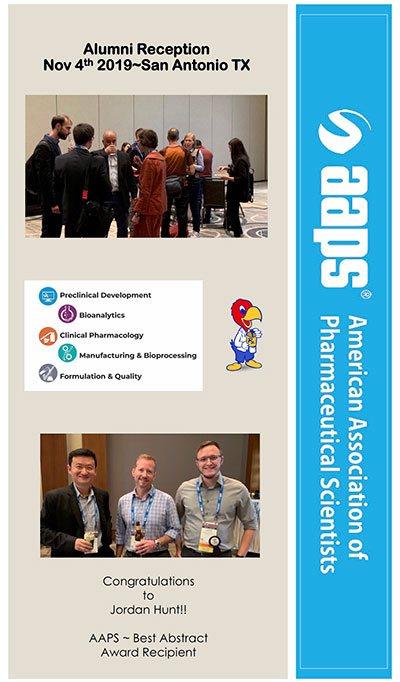
Undergraduate Research Program
The URP was successfully completed with poster presentations by our students on July 26, 2019. The program is directed by Dr. Cory Berkland with the assistance of Ann Heptig and Nicole Brooks. This program is one of the recruiting tools to attract potential graduate students to the department. The 2019 summer URP participants were:
- Noora Batrash, University of Kansas. Lab: Dr. Brandon DeKosky
- Shelby Clark, University of Kansas. Lab: Dr. Cory Berkland
- Richard Dolder, University of Georgia. Lab: Dr. Cory Berkland
- Victoria Gomerdinger, Yale University. Lab: Dr. Cory Berkland/Dr. Brandon DeKosky
- Baily Kane, University of Wyoming. Lab: Dr. David Volkin
- Shelby Lierz, Kansas State University. Lab: Dr. Michael (Zhuo) Wang
- Mikayla Smith, University of Kansas. Lab: Michael Hageman
- Stephanie Xiong, California State University, Fullerton. Lab: Michael Hageman
Ninety-five undergraduate students from different departments and programs on campus presented posters at the KU Summer Undergraduate Research Poster Session sponsored by KU’s Center for Undergraduate Research on July 26, 2019. For a complete listing of participants, along with their hometown, home institution, project title, faculty mentor and and department, please go to: Ninty-five undergraduates to present summer research.
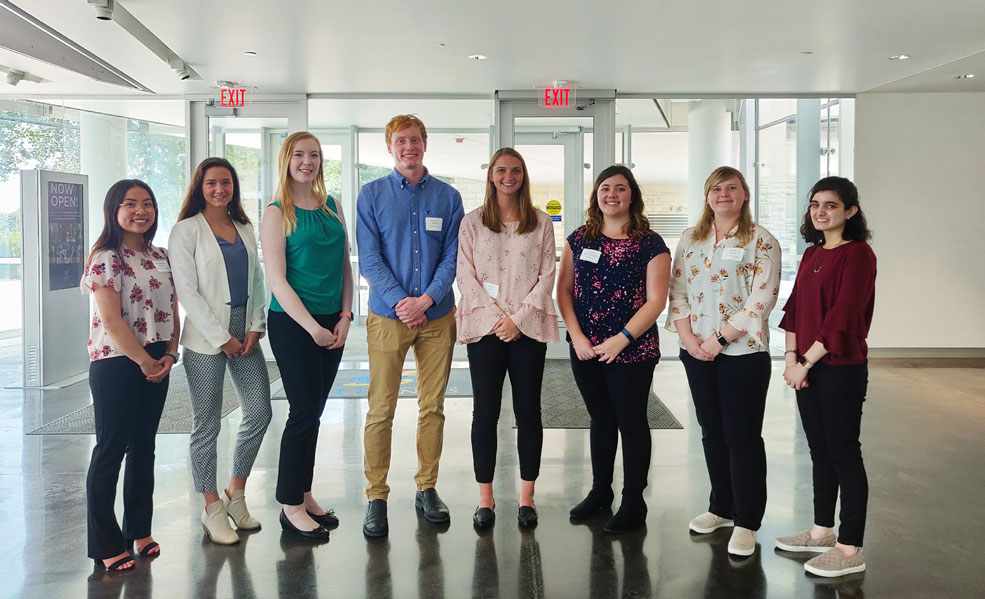
Department Staff Updates
Nicole Brooks has been with the department for 17 years. She still enjoys traveling, cooking, crafting and spending time with family and friends. Her son Jacob is about to turn 16 and is a Sophmore in high school and continues to play football and baseball. In August of 2018 she and Jacob moved out of Lawrence and in with her boyfriend (Mike) and his 2 kids (Rachel, 15 and Jack, 14) northwest of Lake Perry.
Tammy Dunning has completed her twenty-eighth year in the Pharm Chem Department, and eighteenth year as Editorial Assistant for the Journal of Pharmaceutical Sciences. Her hobbies include quilting, reading, working in her yard and watching KU football and basketball games.
Karen Hall Wow!!! I’m closing in on 20 years with the department. Working with a great group of people makes coming to work so much fun. No big trips planned for the foreseeable future, but I’m good with staying home with my feline babies. Down to 9 this year . . . but Hotel Hall still has it’s NO VACANCY sign out.
Michelle Huslig joined the department in Dec 2018, taking over for Nancy upon her retirement. She has worked at KU over 16 years and is a life long Jayhawk fan. Her two dogs, Frank and Miles, keep her busy on a daily basis but she still finds plenty of opportunities to enjoy her house plant collections and reading a good book.
Becky Whaley continues to work with J. Pharm. Sci., which she has been doing since September, 2001. She enjoys spending time with her families and her granddaughters, Kinley, age 6, Harper, age 16 months, and grandsons, Kason, age 4 and Hudson, age 3.
Nancy Helm retired from the University of Kansas in December 2018. She had worked 42 year for the Department of Pharmaceutical Chemistry. She was honored with a reception on December 7, 2018.
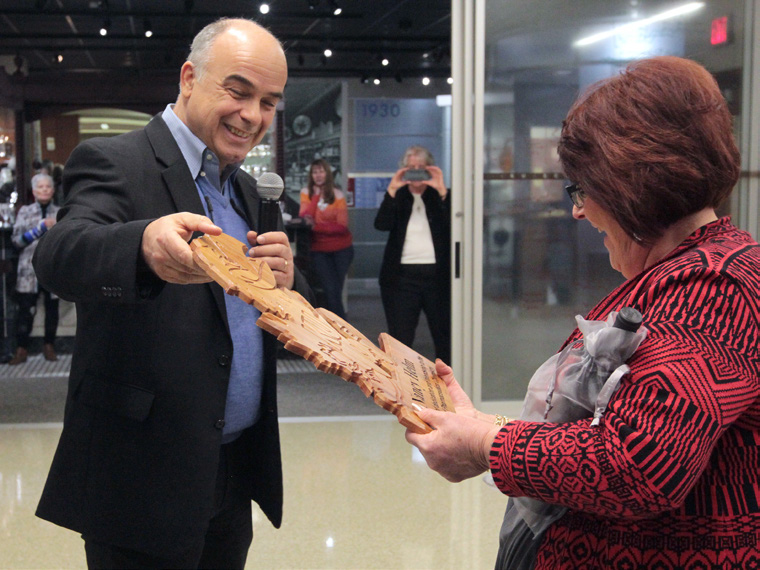
Ann Heptig retired from the University of Kansas in October 1, 2019. She had worked 18 year for the Department of Pharmaceutical Chemistry. 43 years for the University of Kansas.
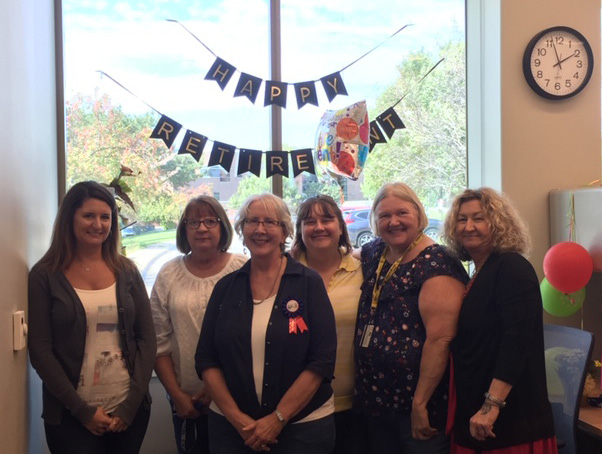
Faculty Updates
Ken Audus
Professor Ken Audus started his transition back to the Department of Pharmaceutical Chemistry Faculty full-time in August, 2019 after having served for fifteen years as Dean of the School of Pharmacy. Ken’s next transition to retirement is still a few years away but it has been nice for him to step away from a hectic, “always scheduled for something or somewhere” life. His research interests continue in drug transport and permeability properties of the placenta and blood-brain barriers primarily through collaborative and consultative type relationships on various research projects with colleagues at KU. He is continuing to teach an elective course for pharmacy students and is now coordinating and teaching a graduate course on cell and molecular pharmaceutics, as well as continuing his role on the board of directors for GPEN, and his functions as an editor for JPharmSci. On the personal side, Ken and Cheryl enjoy their grandchildren Luke (16 years old), Mae (12 years old), and the twins, Iris and Vera (2 and a half years old). Ryan & spouse Sarah live and work in the Leawood, Kansas area (Kansas City metro). Consequently, we (rather than mostly Cheryl in the past) get to see and watch the grandchildren often. Carly is working and living in Lawrence and spends a lot of time with her significant other, Ben. Cheryl is “retired” but is always it seems working on landscaping, decorating or remodeling the house, spoiling the grandkids, and traveling with Ken when she can. In his spare time which now occurs more frequently, Ken mostly likes to find a golf course with friends, watch Luke and Mae in sports or school activities, do some research on his family genealogy, follow Jayhawk sports of course, and is serving as Cheryl’s assistant with home projects more often.
Cory Berkland
Professor Cory Berkland’s lab continues to bridge research in Pharmaceutical Chemistry, Chemical Engineering, and Bioengineering at KU. The lab recently completed a research collaboration with Orion BioScience sponsored by the Juvenile Diabetes Research Foundation aiming to prevent the progression of Type 1 Diabetes using antigen-specific immunotherapy. Lab members have been exploring intratumoral immunotherapy with Prof. Forrest, designing specific molecular structures to retain drugs at the tumor site and draining lymph nodes. A clinical trial was initiated with KU Cancer Center on a drug repurposed for this application. Finally, new industry sponsored research projects are exploring ‘smart’ soft martials capable of sensing compression and shear forces.
Brandon DeKosky
Professor Brandon DeKosky’s lab is up and running for a strong start to 2020. We have been focused on high-throughput technologies for engineering immune responses, antibody drug discovery, and vaccine design. Ongoing projects include the development of new antibody discovery screening technologies, which have been applied to improve HIV and flavivirus vaccines as well as discover new antibodies against a range of human disease antigens. We are collaborating with several industrial partners in various projects for antibody discovery and improvement. The lab is also developing new ways to better understand how antibody mutations affects the functional landscape, both for antibody improvement and to better understand antibody generation in vivo. Finally, we have some exciting collaborations for new biomaterial-based strategies to optimize antigen presentation for improved vaccine formats. As a KU undergraduate alumnus, Dr. DeKosky is enjoying KU basketball, playing soccer, and practicing yoga in his spare time.
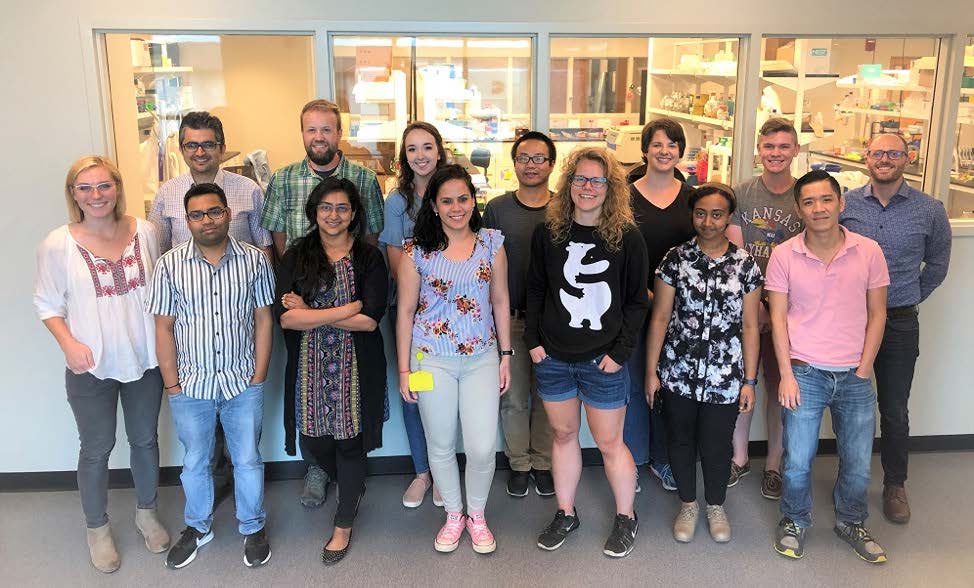
Front row: Bharat Madan, Rukmini Ladi, Sheila Lopez, Brooklyn Mussman, Amen Hailemariam, Andrew Chung
Laird Forrest
Professor Laird Forrest’s group continues their work in drug formulation, immune agonist development and Alzheimer’s. In the last year, Ninad Varkhede graduated and joined Merck’s PKPD group, Ryan Moulder joined Amgen’s small molecule preformulation group, and Allie Brachtenbach joined Pfizer in downstream process development.
Michael Hageman
Professor Michael Hageman Greetings from the Hageman lab for Physical Pharmacy and Drug Delivery (P2D2), newly formed, and located on the second floor of the new addition to Simon’s Labs. While it has taken a while to get these beautiful labs functioning, I am pleased that we are now generating data. Lab equipment for spray drying, fluidized bed coating and microfluidic homogenization has been acquired. Instruments for solids characterization (TGA, mDSC, vapor sorption, KF, PXRD, PLM, rotating disc dissolution), colloidal characterization (DLS, zeta-potential, side-by-side diffusion cells), analytical chromatography (HPLC and UPLC with ELSD, PDA, DWA, fluorescence, and qDA mass detector) are in place.
We have two third year graduate students, Anil Basra and Zhaoxian (George) Wang who are working on compositional aspects (mixtures of polymers and surfactants) of amorphous solid dispersions to generate high levels of supersaturation upon dissolution in complex media of the GI tract. They were joined by two summer undergraduate researchers (URPs), Ben Rajewski and Stephanie Xiong, who are either in graduate school now or applying to graduate school. A post-doc, Tahnee Dening, from University of Southern Australia is currently exploring the use of tight junction modulators from the cadherin family (Siahaan’s lab) for gastrointestinal permeation enhancement of peptides. Her work also investigates the interaction of bile acid mixed micelles (BAMM) with peptides to limit enzymatic degradation and subsequent flux of the peptides. The role of phospholipids in the BAMM interaction with peptides is being explored with a new graduate student, Olivia Henderson. Similarly, another new graduate student, Waleed Elballa, will be working jointly between our lab and Dr. Siahaan’s to explore design of permeation enhancers specifically for oral drug delivery which can effectively diffuse through the mucin layer. We also had a post-doc, Yu (Cathy) Zhan who set up cell culture lab for Jurkat cells to study DMSO-free stabilization during freezing and dehydration to study the shelf-storage of similar CAR-T Therapeutic Cells. She was assisted by an international undergraduate research scholar (Leqi Fan) who is currently applying to graduate schools. Cathy has recently left the lab to join Deciphera, a Lawrence-based drug discovery company. Lastly, we have a PharmD student, Mikayla Smith, who has spent several semesters working on amorphous systems for delivery of supersaturated amphotericin B. It has also been very interesting to be working with distance master students from Amgen, Pfizer and Genentech, keeping me touch with research in an industrial setting.
I have also had the opportunity to become director of the Biopharmaceutical Innovation and Optimization Center (BIOC) which is a KU centralized resource for preclinical characterization to support the NCI Cancer efforts at the KU Med Center as well as any academic labs and/or businesses desiring to move molecules from discovery and through preclinical evaluation. Our labs are located in the McCollum Labs and include the expertise of Dr. Lian Rajewski, Dr. John Haslam, Joanna Krise, William McGinnis, and Lanaea Heine.
On a personal level, we have moved to Lawrence and finally sold our home in New Jersey. My wife, JoAnn, has a part time job in Topeka and we are slowly getting acclimated to the pace of life here. While our kids are scattered, Kelly (San Antonio), Kristin (Minneapolis), Dan (Chicago), Tom (Pittsburgh) and Kara (Cleveland), they are sorta in the midwest. We are closer than we have been (during our adult lives) to our families, mine in Wichita and JoAnn’s near Minneapolis, allowing us to easily make weekend visits.
If you are ever visiting Lawrence, we would love for you to stop by and say Hi!
Anna Hagen
Dr. Anna Hagen is teaching three classes: “Writing and Communicating Science for Graduate Students” to second-year Pharmaceutical Chemistry graduate students in the spring (in time for submitting and presenting their Ph.D. thesis proposals), and two electives for P3 Pharmacy students called “Scientific Writing for the Health Professional” and “Presentations for the Health Professional”. She continues to explore new ways to teach writing, slide design, and communication.
Jeff Krise
Professor Jeff Krise and his group continue to study how small molecular weight drugs localize and distribute within cells and how this impacts therapeutic outcomes. Our recent emphasis has been focused on the extensive accumulation of weakly basic drugs in acidic lysosomes. We are interested in understanding how the lysosomal entrapment of drugs observed in single cells grown in culture impacts whole body pharmacokinetic distribution behavior. In addition, we are interested in understanding how drug accumulation in lysosomes influences their normal structure and function. This research may ultimately lead to a better understanding regarding how drugs exert their desirable therapeutic effects as well as undesirable side effects. Jeff and his wife Joanna and their three children [Edward (5), Steven (12) and Abigail (14)] wish everyone the best.
Russ Middaugh
Professor Russ Middaugh is still actively doing research and teaching in the department.
Bill and Wendy Picking
Professors Bill and Wendy Picking Greetings from the Picking-land laboratories. Bill and Wendy Picking are now in their fifth year in the Department of Pharmaceutical Chemistry at KU. Bill has stepped aside from his directorship at the Higuchi Biosciences Center to focus more fully on research. Wendy continues to build upon her biotechnology start-up (Hafion) as part of the group’s overall vaccine development efforts. Francisco Martinez-Becerra has stepped aside as Director of the Immunology Core Laboratory (ICL) to pursue a position as a Principal Scientist at Nucleus Biologics in La Mesa, CA. The laboratory group has continued to evolve. Ryan Skaar has received is MS degree and moved on to NanoBio Designs in Indianola, IA. Current senior folks in the lab include Qi Zheng, Ti Lu, Meenakumari Muthuramalingam (Meena), Shoichi Tachayama, Siva Ratnakaram, Sayan Das and Sean Whittier.
The group attend the Great Plains Infectious Disease (GPID) Meeting, which was hosted by our colleagues at the University of Missouri. Bill presented his type III secretion system structure work at the meeting and Meena and Shoichi also presented posters. Shoichi, Ryan and Meena also presented posters at the American Society for Microbiology in San Francisco with Shoichi and Ryan also selected to give oral presentations. Shoichi also presented a poster at the US-Japan Conference on Cholera and Other Bacterial Enteric Infections in Osaka, Japan (December 2019) after which he spent some time relaxing with his family in Tokyo.
The coming year looks to be a busy one with numerous grant submissions and manuscripts in the works. We look forward to the challenges of the upcoming year and the new paths forward that will arise during that time.
Christian Schöneich
Professor Christian Schöneich The year 2019 was another eventful and happy year for the entire family. Our son Sebastian got married to Erin Ice in June in Italy, were we received family and friends in the Venetian villa of the family close to Venice. A significant contingent of Erin’s and Sebastian’s friends traveled from all over the US to Italy, with stops in Paris, Switzerland etc. These events do not go without unforeseen complications such as, for example, one friend taking the wrong train from Rome, traveling south, direction of Naples, instead of north, direction of Venice. Unfortunately, he missed the reception in the evening of this day, but arrived on time next day for the actual wedding ceremony. Sebastian has started his medical residency at the University of Michigan, Ann Arbor, and is enjoying the many opportunities this environment is presenting to him. Sonia is continuing her graduate studies in analytical chemistry at the University of Washington, Seattle, with emphasis on 2D GC-MS analysis. She will be taking her qualifying exam this year, and is looking forward to leaving classroom work and exams behind. Her work is going well, and she has authored/co-authored three manuscripts so far. Antonio continues to do well in his PhD work in aerospace engineering at the University of Maryland, College Park, and his work on supersonic aircraft is a collaboration with NASA, where he just spent a couple of weeks for experiments with a supersonic wind-tunnel.
Elena and Christian shared a brief vacation in Southern Tirol in the Italian Alps, just around the language border between Italian and German. It was interesting to be asked to speak German in Italy. This is a remnant of World War I, after which a section of Austria was given to Italy. Professionally, the year 2019 has, again, been full of interesting scientific results and collaborations. Professional travel has led to Austria, Hungary, China, Switzerland, and Germany, as well as several places in the US.
Teruna Siahaan
Professor Teruna Siahaan’s group is still working on utilizing cadherin peptides to modulate the blood-brain barrier (BBB) for improving in vivo delivery of molecules to the brain as well as using cell adhesion peptides to targeting molecules to antigen-presenting cells for controlling autoimmune. Two senior students earned their Ph.D. degrees in 2019. Kavisha Ulapane graduated with Honors in July 2019 and she is currently working at Merck Company, Rahway, New Jersey. Brian Kopec also graduated in December 2019 and he is now working at Verge Genomics Inc., San Francisco, California. The current group members include Kelly Schwinghamer, Rucha Mahadik, Subradweep Patra, Jinyang He, Waleed Elballa, Meagan Weldele, and Darci Ezell.
John Stobaugh
Professor John Stobaugh no longer maintains a research group, but rather continues to collaborate with other faculty. With the help of my son Jordan, I have assembled a nanoLC/MS system that is used for the resolution of complex mixtures. We refer to this instrumental setup as an Xtreme Ultra-Pressure Liquid Chromatograph (XUPLC), with routine operation at ~40K psi. Separations are conducted using a nanocolumn with dimensions of 75 μm ID x 1 m in length, packed with sub-2μ particles, which is interfaced to a HRMS (Waters Xevo G2 QToF). These columns are self-packed using packing/washing stations that were designed in my laboratory.
As to other activities, I am currently busy managing the family land back in Texas. A complete repurposing is underway, from crops to 100% grass, as I want to be in the beef cattle business. Below is a picture of a guy we call “Stud Muffin” as gentle as they come.
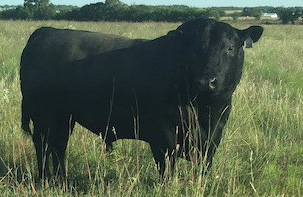
Thomas Tolbert
Professor Thomas Tolbert and his group continue to study antibody glycosylation, the production of protein drug conjugates, and the use of antibody fragments as a model system for understanding mAb function. At the end of March 2019, graduate student Derek White successfully defended his dissertation and began working at AbbVie. Professor Tolbert spent a lot of the last year repairing lab equipment including the lab’s mass spectrometer, which thankfully is now working.
David Volkin
Professor David Volkin This past year has been a very exciting one for Dr. Volkin’s group. The Vaccine Analytics and Formulation Center (VAFC) was officially launched this year. The new center focuses on new vaccine and biotherapeutic drug candidates for use in the developing world. Several new grants were awarded to the VAFC (with Dr. Volkin as PI and VAFC Director Dr. Sangeeta Joshi as co-PI) in 2019. A KU press release describing these events was published in December 2019.
In the past year, there were several well-deserved promotions for our VAFC scientific staff members. Drs. Prashant Kumar, Kawaljit Kaur and Vineet Gupta were promoted from Associate Researcher to Senior Scientist. Dr. Swathi Pullagurla and Dr. David Holland were promoted from Postdoctoral Researcher to Associate Researcher. In addition, Soraia Saleh-Birdjandi was promoted from Research Assistant to Senior Research Assistant.
A new Postdoctoral Researcher, Dr. Nitya Sharma, recently joined the lab after completing her graduate studies at the Hilleman Laboratories in New Delhi, India. Shweta Mapari also joined the lab as a Research Assistant after completing her MS degree in Chemical Engineering at KU.
Two of Professor Volkin’s graduate students, Yue Hu and Sanjeev Agarwal passed their PhD dissertation defenses and are now working in the biopharmaceutical industry. Dr. Hu accepted a position as Scientist with BMS in New Jersey and Dr. Agarwal accepted a position as Scientist with Amgen in Southern California.
Overall, 2019 was a very busy and productive year in the VAFC. We expect 2020 to be a very promising year and wish you the same!
Michael Wang
Professor Michael Wang joined the department in August 2011 and he was promoted to Associate Professor with tenure in 2016. His group currently has four graduate students, Mei Feng (6th year), Iris Qiu (5th year), Yiru Jin (2nd year) and Srija Ramisetty (1st year). Dr. Lijun Liu recently joined the lab as Associate Researcher in November. Laura Doyle successfully defended her PhD dissertation on April 15, 2019 and is now working at Catalent. Iris was selected to give a poster presentation at the AAPS 2019 in San Antonio. Dr. Wang’s lab hosted a summer Undergraduate Research Program (URP) student Shelby Lierz (Kansas State University) this past summer. This year, Dr. Wang received an R01 award from the National Institute of Allergy and Infectious Diseases (NIAID) to identify CYP5122A1 inhibitors as chemical probe for Leishmania biology. In addition, his group is also working on a project to develop quantitative proteomic method for the absolute quantification of drug metabolizing enzymes, drug transporters, nuclear receptors and proteins important for antibody disposition (e.g., FcRn). Dr. Wang continues to collaborate with Prof. Karl Werbovetz (Ohio State University) and Prof. Kai Zhang (Texas Tech University) to develop azole-arylimidamide combination therapy against leishmaniasis and assess essentiality of key sterol biosynthetic enzymes in Leishmania. On the family side, Jenny is now a 6 years old kindergartener at Langston Hughes Elementary and Jacob is a 11 years old 6th grader at Bishop Seabury Academy. His wife Judy continues to teach in our PharmD Professional Program.
Additional Updates
- Iris Qiu presented at AAPS 2019 (poster #M1330-11-73).
- Laura Doyle defended her Ph.D. dissertation on April 15, 2019.
- Yiru Jin, Srija Ramisetty and Dr. Lijun Liu joined the lab.
- Shelby Lierz completed the Undergraduate Research Program.
- Dr. Wang received a new NIH R01 award to identify CYP5122A1 inhibitors as chemical probes for Leishmania biology.

